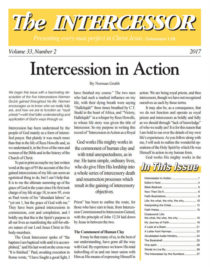
Bible Bedrock
“For assuredly, I say to you, whoever says to this mountain, ‘Be removed and be cast into the sea,’ and does not doubt in his heart, but believes that those things he says will be done, he will have whatever he says.” –Mark 11:23 (New King James)
Unless we differentiate between the external doubts of the mind and the central faith of the heart, we get into difficulty. When Jesus said, “Whosoever shall say unto this mountain, Be thou removed…,” He added “and shall not doubt in his heart, but shall believe that those things which he saith shall come to pass; he shall have whatsoever he saith.”
He said, “shall not doubt in his heart,” not his head. There is the difference. Our reasons and emotions are what the Bible calls our soul, and they are the external means by which we express our true inner selves, which is our spirit. Our reasons express our inner knowledge; our emotions, our inner love. But both reason and emotion are open to influences from without as well as controlled from within, therefore they vary. We may think or feel one thing one moment, and another another; indeed, we are meant to, for that is our living contact with the world.
But in our spirits, our hearts, our fixed choices are made. That is where, spirit with Spirit, we are united with God. Now an act of faith is made there in our heart, our spirit. It is a free, definite, fixed choice. We have confirmed it by our word of faith. Therefore, we do not move. But doubts will recur any time. That is normal in our contact with the world of appearances, which seems to run clear contrary to faith. If we have discerned between soul and spirit, and, therefore between the variable thoughts of our minds and the invariable, fixed choices of our hearts, we shall not accept false condemnation as if we were being shaken in our faith, and mistake doubts in the mind for “doubting in the heart.” We shall merely replace the doubts by the reaffirmation of the faith.
And if what we have trusted God for never seems to happen? Once we have moved over from our questionings and hesitations to what we understand to be His will and have spoken the word of faith concerning it, we never move back. It is not faith in our faith, but faith in Him. We have trusted Him. It is now His business. Leave Him to mind His own business. Even if we are tempted to think we were mistaken in our guidance, leave Him to untie the knot: He has ways in which He brings us and all concerned to the total answer: “Yes, that’s it. That’s what we meant by our prayer of faith.” If not in time, we shall see it in eternity. He that believes in Him shall never be confounded.
—The Spontaneous You
by Norman Grubb





